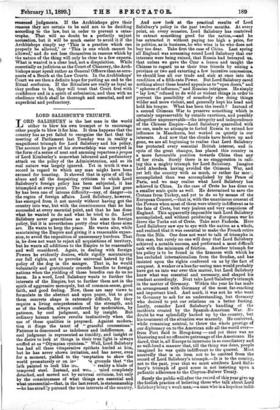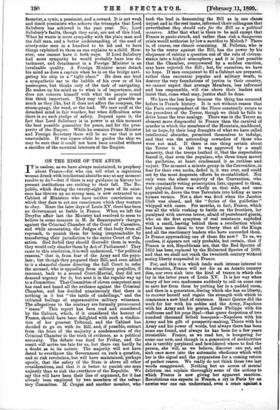LORD SALISBURY'S TRIUMPH.
TORD SALISBURY is the last man in the world J either to blow his own trumpet or to encourage other people to blow it for him. It thus happens that the country has as yet failed to recognise the fact that the meeting of Parliament last Tuesday was in reality a magnificent triumph for Lord Salisbury and his policy. The account he gave of his stewardship was conveyed in the form of a series of neat and amusing repartees apropos of Lord Kimberley's somewhat laboured and perfunctory attack on the policy of the Administration, and so its real nature was largely ignored. Yet in truth it was a record in regard to which any man might have been excused for boasting. It showed that in spite of all the abuse and all the despairing criticism to which Lord Salisbury's foreign policy has been subjected, it has triumphed at every point. The year that has just gone by has been one of intense difficulty—nay, of danger—in the region of foreign affairs. Lord Salisbury, however, has emerged from it not merely without having got the country into war, but with the consciousness that he has succeeded at every essential point, and that he has done what he wanted to do and what he tried to do. Lord Salisbury never generalises as to his aims in foreign policy, but it is nevertheless pretty clear what those aims are. He wants to keep the peace. He wants also, while maintaining the Empire and giving it a reasonable expan- sion, to avoid the imposition of unnecessary burdens. That is, he does not want to reject all acquisitions of territory, but he wants all additions to the Empire to be reasonable and well considered. Again, in dealing with foreign Powers he evidently desires, while rigidly maintaining our full rights, not to provoke universal hatred by the policy of the dog in the manger. That is, he would voluntarily and gratuitously concede benefits to foreign nations when the yielding of those benefits can do us no harm. In a word, Lord Salisbury wants to further the interests of the Empire, but to further them not in the spirit of aggressive monopoly, but of common-sense, good faith, and good feeling. Now, these are easy views to formulate in the abstract and upon paper, but to give them concrete shape is extremely difficult, for they require a living comprehension of the strength, and so of the benefits, always conferred by moderation, by patience, by cool judgment, and by insight. But ordinary human nature revolts instinctively when the use of these qualities is proposed. Against modera- tion it flings the taunt of " graceful concessions." Patience is denounced as indolence and indifference. A cool judgment is represented as timidity, and insight or the desire to look at things in their true light is always scoffed at as "Olympian cynicism." Well, Lord Salisbury has had all these vituperative epithets hurled at him, but he has never shown irritation, and has never, even for a moment, yielded to the 'emptation to show the world prematurely or on in' *e grounds that "the lath painted to look like iro.. reality a blade of tempered steel. Instead, and wilt. mind completely detached, and moved not by external criticism, but only by the consciousness of what things are essential and what unessential—that, in the last resort, is statesmanship —he has stead:'.y pursued the true interests of the country. And now look at the practical results of Lord Salisbury's policy in the past twelve months. At every point, on every occasion. Lord Salisbury has contrived to extract something good for the nation,--and he has extracted it without paying too high a price, for in politics, as in business, he who wins is he who does not buy too dear. Take first the case of China. Last spring all England was screaming round Lord Salisbury that our interests were being ruined, that Russia had betrayed us, that unless we gave the Czar a lesson and taught the Chinese to regard us as their true friends by seizing a province or two and extorting a few lucrative concessions, we should lose all our trade and sink at once into the condition of a fifth-rate Power. But Lord Salisbury cared nothing about these heated appeals as to "open doors," and " spheres of influence," and Russian intrigues. He simply " lay low," refused to do wild or violent things in order to prevent the possibility of somebody else doing things wilder and more violent, and generally kept his head and held his tongue. What has been the result ? Instead of a second Crimean War to preserve something which is certainly unpreservable by outside exertions, and possibly altogether unpreservable—the integrity and independence of the Chinese Empire—Lord Salisbury quarrelled with no one, made no attempts to forbid Russia to extend her influence in Manchuria, but worked on quietly in our interests. And now that the clouds have broken up and gone, we are all beginning to realise that Lord Salisbury has protected every essential British interest, and in spite of the great changes, has placed this country in a more favourable position towards China than any of her rivals. Surely there is no exaggeration in call- ing this a mighty triumph for Lord Salisbury. Imagine Lord Aberdeen having avoided the Crimean War, and yet left the country with as much, or rather far raw, accomplished than was accomplished by the Peace of Paris, and we may realise what Lord Salisbury has achieved in China. In the case of Crete he has done on a smaller scale quite as well. He determined to save the Cretans from Turkey, and yet to do so by means of the European Concert,—that is, with the unanimous consent of the Powers when most of them were utterly indifferent as to the fate of Crete, but very jealous and very suspicious of England. This apparently impossible task Lord Salisbury accomplished, and without producing a European war ho drove the Turks out of Crete. Take next Fashoda. Here Lord Salisbury saw eye to eye with the nation as a whole, and realised that it was essential to make the French retire from the Nile. One does not want to talk of triumphs in this case, but surely no one will deny that Lord Salisbury achieved a notable success, and performed a most difficult task with the minimum of friction. Another triumph for his policy is to be found in the firmness with which he has excluded internationalism from the Soudan, and has insisted upon the rights conferred on us by the fact of conquest. A weaker or a less far-seeing man would probably have got us into war over this matter, but Lord Salisbury knew what was essential and necessary, and shaped his conduct accordingly. Next take Lord Salisbury's triumph in the matter of Germany. Within the year he has made an arrangement with Germany of the most far-reaching and important kind. And mark, it was not he who went to Germany to ask for an understanding, but Germany who desired to put our relations on a better footing. Lastly, consider Lord Salisbury's handling of the incidents created by the Spanish-American War. No doubt he was splendidly backed up by the country, but his treatment of the situation was masterly. He contrived, while remaining neutral, to throw the whole prestige of our diplomacy on to the American side all the world over— from Port Said to Hong-tong — and yet there was no blustering and no offensive patronage of the Americans. He dared, that is, all Europe to intervene in so conciliatory and so well-bred a manner that, till the thing was done, people imagined he was quite indifferent to the quarrel. Most assuredly that is an item not to be omitted from the record of Lord Salisbury's triumph.—It is to the coming, not to the past, year that we must attribute Lord Salis- bury's triumph of good sense in not insisting upon a pedantic adherence to the Clayton-Bulwer Treaty.
Surely the public will after the rec)rd of this year give up the foolish practice of believing those who talk about Lord Salisbury being 1 weak man,—a man who is a hopeless indif- ferentist, a cynic, a pessimist, and a coward. It is not weak and timid pessimists who achieve the triumphs that Lord Salisbury has achieved in the past year. No ; Lord Salisbury's faults, though they exist, are not of this kind. What he wants is more sympathy with the plain man and the dull man, and a better understanding of the need of ninety-nine men in a hundred to be led and to have things explained to them as one explains to a child. How- ever, one cannot have it both ways. If Lord Salisbury had more sympathy he would probably have less de- tachment, and detachment in a Foreign Minister is an invaluable quality. A Foreign Minister must detach his mind as does a captain when he is on the bridge navi- gating his ship in a " tight place." He does not lend a sympathetic ear to the babble of his crew or of his passengers, but thinks only of the task of navigating. He makes up his mind as to what is of importance, and does not concern himself with what the people round him think important. They may talk and grumble as much as they like, but it does not affect the compass, the steam-gauge, the wind, or the lead. We may scoff at the detached mind in fair weather, but when difficulties arise there is no such pledge of safety. Depend upon it, the fact that Lord Salisbury is in power is at this moment the best possible guarantee for peace, and for the pros- perity of the Empire. While he remains Prime Minister and Foreign Secretary there will be no war that is not unavoidable. If war comes while he guides the ship we may be sure that it could not have been avoided without a sacrifice of the essential interests of the Empire.







































 Previous page
Previous page